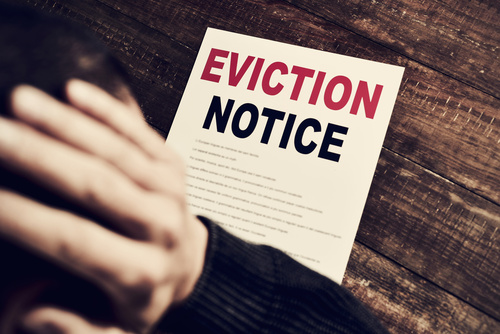EVICTION
You received notice from us that your landlord has filed a dispossessory action against you to evict you from your residence. This is the first step in the eviction process. We received information about your eviction from the online court records and you may have received our notice before you received notice from the sheriff. You will have 7 days from the date you receive notice from the sheriff to file an answer with the court. If you do not file an answer or take other action to stop the eviction, the court will issue to your landlord a writ of possession, after which your landlord can have the sheriff’s office remove your belongings from the premises. You need to take action immediately to stop the eviction process.

We recommend that you file an answer with the court so that the court will set a hearing date for the eviction. You can do this by going to the courthouse and filling out a form provided by the clerk. The clerk will then give you a hearing date. At the hearing, you will need to be able to present to the judge information as to why you think your landlord does not have the right to evict you or you could present proof that you filed a bankruptcy case to stop the eviction. We recommend that you attempt to work the situation out with your landlord first but if that does not work, you can file either a Chapter 7 or Chapter 13 bankruptcy case to stop the eviction.
It is important that you act quickly because if the court issues a writ of possession to your landlord, it is very difficult to stop an eviction through filing a bankruptcy case; however, if a writ of possession has not been issued, filing a bankruptcy case to stop the eviction is straightforward. Your financial situation and your intentions with respect to the property will determine whether a Chapter 7 or Chapter 13 is most appropriate. If your intentions are to stop the eviction to buy yourself time to relocate and you do not want to be responsible for any past due rent, then a Chapter 7 may be the way to go. If you would like to stay in your residence and continue to make the rent payments on a going forward basis, then a Chapter 13 may be more appropriate. In a Chapter 13, you propose to pay back the arrears over an extended period of time through a Chapter 13 plan. Another factor to consider is when your lease is set to expire. While bankruptcy will stop the eviction, it does not force the landlord to renew your lease when it expires.

COURT RECORDS
Much of the information we obtain regarding legal action taken against you comes from court records.

QUESTIONS & ANSWERS
Contact our office with questions about the notice and simply want additional information.

CONTACT US
We get information from the courts and other public records as soon as the legal action has been initiated.

